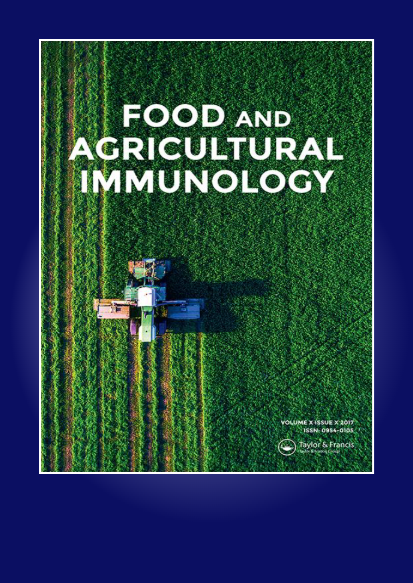Morphology-regulated core–shell Ag@Au NPs for rapid SERS detection of 1-amino-hydantoin (AHD) in crayfish
IF 2.1
3区 农林科学
Q3 CHEMISTRY, APPLIED
引用次数: 1
Abstract
ABSTRACT Gold-coated silver core–shell nanoparticles (Ag@Au NPs) have been widely used for SERS analysis due to plasmon resonance performances. However, it is a great challenge to fabricate Ag@Au core–shell structures with specified morphology. In this paper, the size and shape of Ag NPs (core) were precisely controlled by a seed-mediated approach, and then the gold shell was completely coated on under the strong reduction of ascorbic acid, resulting in Ag@Au NPs with highly regulated morphology. The obtained Ag@Au NPs achieved a similar or even better SERS enhancement factor (EF) (up to 5.7 × 107) compared to Ag NPs, but significantly higher stability. For the rapid SERS detection of nitrofurantoin metabolite AHD, a limit of detection (LOD) as low as 1 × 10−10 M and a wide linear range from 1 × 10−4 to 1 × 10−8 M were obtained. Furthermore, recoveries for crayfish samples were from 90.5% to 108%, indicating a good performance of the presented method in real sample detection.形态学调控核壳Ag@Au NPs快速SERS检测小龙虾中1-氨基-乙酰胆碱(AHD)
摘要:镀金银核壳纳米颗粒(Ag@AuNP)由于等离子体共振性能而被广泛用于SERS分析。然而,制造是一个巨大的挑战Ag@Au具有特定形态的核壳结构。在本文中,通过种子介导的方法精确控制Ag NPs(核)的大小和形状,然后在抗坏血酸的强烈还原下将金壳完全覆盖,从而产生Ag@Au形态高度调控的NP。获得的Ag@AuNP获得了类似甚至更好的SERS增强因子(EF)(高达5.7 × 107)但是显著更高的稳定性。对于呋喃妥因代谢产物AHD的快速SERS检测,检测限(LOD)低至1 × 10−10 M,线性范围从1 × 10−4比1 × 得到10−8 M。此外,小龙虾样品的回收率为90.5%-108%,表明该方法在实际样品检测中具有良好的性能。
本文章由计算机程序翻译,如有差异,请以英文原文为准。
求助全文
约1分钟内获得全文
求助全文
来源期刊

Food and Agricultural Immunology
农林科学-毒理学
CiteScore
5.30
自引率
6.70%
发文量
52
审稿时长
2 months
期刊介绍:
Food and Agricultural Immunology is an international open access journal publishing original immunological research with applications in food, agricultural, environmental and veterinary science. Submissions describing the use of immunological techniques and methods are particularly welcomed.
The journal aims to expand our understanding of the interactions at the interface of food and immune systems including studies on:
-Development of diagnostic systems – all types of ligand-based assays, e.g. antibody, aptamer
-Application of ligand-based assays for the detection or identification of molecules of interest in food science, agricultural research, veterinary investigations and clinical systems relating to food allergy or sensitivity to agricultural chemicals
-Effects of food on the immune system
-Studies on allergy and allergic reactions
-Investigations into food allergies
-Development of allergen-free food systems
-Development of novel assay formats
-Applications of assay systems to the monitoring of food items in relation to safety and labelling
-Food quality issues, e.g. speciation, adulteration and contamination
-Comparisons between different analytical techniques
The journal publishes research and review articles and is essential reading for food scientists, immunologists and all those concerned with the interaction between food and immune systems.
 求助内容:
求助内容: 应助结果提醒方式:
应助结果提醒方式:


